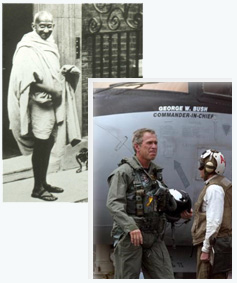War and Peace - Bush and Gandhi
 |
"What difference does it make to the dead, the orphans and the homeless, whether the mad destruction is wrought under the name of totalitarianism or the holy name of liberty and democracy?"
There is a terrible profanity in George Bush's intention to lay a wreath at the memorial of Mahatma Gandhi, the man who uttered those words, during the president's trip to India on a mission of nuclear proliferation and at a time when his draconian occupation of Iraq is spinning into all-out civil war. "It will be as though he has poured a pint of blood" on the great pacifist's memory, writes novelist Arundhati Roy.
Few world leaders today less embody the ideals Gandhi represents than Bush. Does he not know this? Does he think some PR advantage will accrue from his hollow gesture in Rajghat, or that it will mask the horror of his incompetence?
"Grisly attacks and other sectarian violence unleashed by last week's bombing of a Shiite Muslim shrine have killed more than 1,300 Iraqis, making the past few days the deadliest of the war outside of major U.S. offensives, according to Baghdad's main morgue," the Washington Post reported this week. "The toll was more than three times higher than the figure previously reported by the U.S. military and the news media."
"Violent means will give violent freedom."
Bush's visit to the memorial is sure to generate enormous protest, as well it should, but I think it also presents a rare opportunity to bring Gandhi's philosophy of "satyagraha" - truth-seeking, self-sacrifice and nonviolent resistance - to bear on the world Bush has wrought.
While the president and his supporters don't dare mock Gandhi, they take endless delight in mocking, in their self-satisfied ignorance and selective blindness, everything he stood for.
Yet as far as I can tell, human society has never been at a more crucial divide over how to proceed into its own future, and Bush kneeling cynically at Gandhi's memorial - in the midst of a trip whose purpose is to finalize a deal beefing up India's nuclear technology - symbolizes this juncture with unbearable clarity.
"The moral to be legitimately drawn from the supreme tragedy of the bomb is that it will not be destroyed by counter-bomb, even as violence cannot be by counter-violence. Mankind has to get out of violence only through non-violence. Hatred can be overcome only by love."
This is old thought vs. new. One side represents fossil fuels, enemy-based patriotism, endless war and an Old Testament belief in the righteousness of violence (when the good guys use it).
Here, for instance, is Wall Street Journal deputy editor George Melloan's description of Donald Rumsfeld, as quoted by Robert Fisk, when Melloan interviewed the secretary of defense aboard a Boeing 737: "Bright sunlight streams in and lights his face. ... Sitting across from him at a desk high above the clouds, one wonders if the ability of this modern Jove to call down lightning on transgressors will be equal to the tasks ahead."
The other side has stopped believing in Jove. It represents complexity, ambiguity and the reach for a deeper god.
"It is the law of love that rules mankind. Had violence, i.e., hate, ruled us, we should have become extinct long ago. And yet, the tragedy of it is that the so-called civilized men and nations conduct themselves as if the basis of society was violence."
I used to think there was an inevitability to this confrontation, that humanity could not help but evolve beyond its reliance on violence and war, so the future was secure even if the present moment is chaotic. Now I have the permanent jitters. The forces that will destroy us have almost all the money, almost all the political power, and time is running out.
The wreath Bush lays at the base of Gandhi's memorial comes wrapped in the front page of the Washington Post, as it reports on the hemorrhaging "democracy" the president has brought to the Middle East: "Hundreds of unclaimed dead lay at the morgue at midday Monday - blood-caked men who had been shot, knifed, garroted or apparently suffocated by the plastic bags still over their heads. Many of the bodies were sprawled with their hands still bound . . ."
"An eye for an eye makes the whole world go blind."
Robert Koehler, an award-winning, Chicago-based journalist, is an editor at Tribune Media Services and nationally syndicated writer. You can reach him at bkoehler@tribune.com or visit his Web site at commonwonders.com
Related Suggestions
Two leaders - one of a true democracy, ridding the 'Raj' with peaceful methods and the other of the so called 'great' nation bullying the ill-equipped Islamic Nations with the most modern weapons. There is a lesson to be learnt here by the visitor from the late Gandhi philosophy.

















